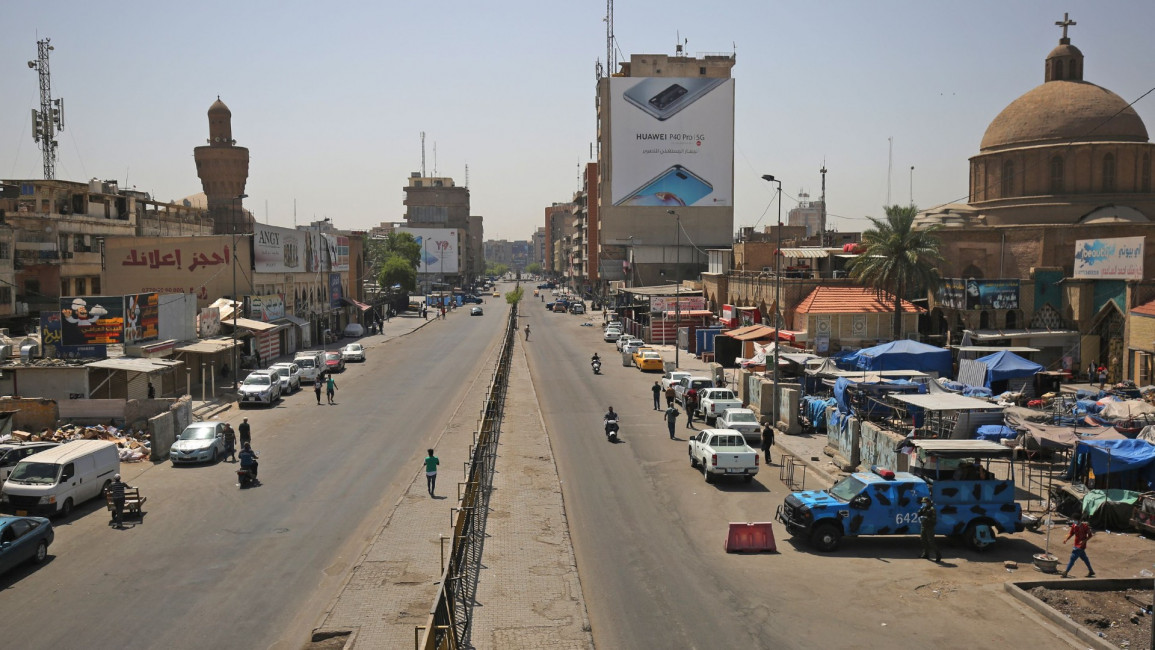Arab economies to shrink by 5.7% amid virus fallout, says UN
Arab economies to shrink by 5.7% amid virus fallout, says UN
Some 14.3 million people will be pushed into poverty, raising the total number to 115 million - a quarter of the total Arab population, the UN report said.
2 min read
Countries like Iraq have seen a surge in cases after moving to ease restrictions [Ge
The pandemic will exact a heavy toll on Arab countries, causing an economic contraction of 5.7% this year, pushing millions into poverty and compounding the suffering of those affected by armed conflict, a UN report said Thursday.
The UN's Economic and Social Commission for Western Asia expects some Arab economies to shrink by up to 13%, amounting to an overall loss for the region of $152 billion.
Another 14.3 million people are expected to be pushed into poverty, raising the total number to 115 million - a quarter of the total Arab population, it said.
More than 55 million people in the region relied on humanitarian aid before the Covid-19 crisis, including 26 million who were forcibly displaced.
Arab countries moved quickly to contain the virus in March by imposing stay-at-home orders, restricting travel and banning large gatherings, including religious pilgrimages.
Arab countries as a whole have reported more than 830,000 cases and at least 14,717 deaths.
That equates to an infection rate of 1.9 per 1,000 people and 17.6 deaths per 1,000 cases, less than half the global average of 42.6 deaths, according to the UN.
But the restrictions exacted a heavy economic toll, and authorities have been forced to ease them in recent weeks.
That has led to a surge in cases in some countries, including Lebanon, Iraq and the Palestinian territories.
Wealthy Gulf countries were hit by the pandemic at a time of low oil prices, putting added strain on already overstretched budgets.
Middle-income countries like Jordan and Egypt have seen tourism vanish overnight and a drop in remittances from citizens working abroad.
War-torn Libya and Syria have thus far reported relatively small outbreaks.
But in Yemen, where five years of civil war had already generated the world's worst humanitarian crisis, the virus is running rampant in the government-controlled south while rebels in the north conceal its toll.
Read also: UN warns of alarming rise of hunger in war-torn Yemen
Rola Dashti, the head of the UN commission, said Arab countries need to "turn this crisis into an opportunity" and address longstanding issues, including weak public institutions, economic inequality and over-reliance on fossil fuels.
"We need to invest in survival, survival of people and survival of businesses," she said.
The UN's Economic and Social Commission for Western Asia expects some Arab economies to shrink by up to 13%, amounting to an overall loss for the region of $152 billion.
Another 14.3 million people are expected to be pushed into poverty, raising the total number to 115 million - a quarter of the total Arab population, it said.
More than 55 million people in the region relied on humanitarian aid before the Covid-19 crisis, including 26 million who were forcibly displaced.
Arab countries moved quickly to contain the virus in March by imposing stay-at-home orders, restricting travel and banning large gatherings, including religious pilgrimages.
Arab countries as a whole have reported more than 830,000 cases and at least 14,717 deaths.
That equates to an infection rate of 1.9 per 1,000 people and 17.6 deaths per 1,000 cases, less than half the global average of 42.6 deaths, according to the UN.
But the restrictions exacted a heavy economic toll, and authorities have been forced to ease them in recent weeks.
That has led to a surge in cases in some countries, including Lebanon, Iraq and the Palestinian territories.
Twitter Post
|
Middle-income countries like Jordan and Egypt have seen tourism vanish overnight and a drop in remittances from citizens working abroad.
War-torn Libya and Syria have thus far reported relatively small outbreaks.
But in Yemen, where five years of civil war had already generated the world's worst humanitarian crisis, the virus is running rampant in the government-controlled south while rebels in the north conceal its toll.
Read also: UN warns of alarming rise of hunger in war-torn Yemen
Rola Dashti, the head of the UN commission, said Arab countries need to "turn this crisis into an opportunity" and address longstanding issues, including weak public institutions, economic inequality and over-reliance on fossil fuels.
"We need to invest in survival, survival of people and survival of businesses," she said.



![A pro-Palestinian encampment at Columbia persists, despite recent arrests. [Brooke Anderson/The New Arab]](/sites/default/files/styles/image_330x185/public/2024-04/417084c8-3251-4705-8422-058fca1d5709.jpg?h=ddb1ad0c&itok=T2cXVfXy)